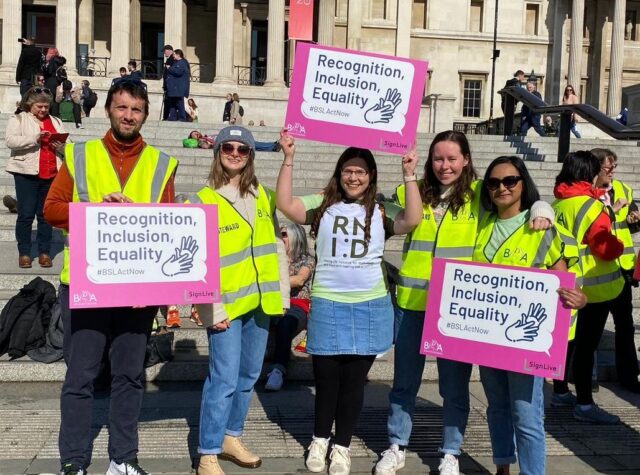Watch this page in BSL


The Government have published its Disability Action Plan (DAP), which sets out new actions aimed at improving the lives of disabled people across the UK.
This includes a pledge from 10 Downing Street to ensure that future major press conferences and briefings from the Prime Minister include an in-person British Sign Language (BSL) interpreter from Spring 2024.
Why this pledge is important
In-person interpreters ensure that deaf BSL users have equal access to information and provide important visible representation on screen during moments of national importance.
In the Disability Action Plan, the Government has outlined the immediate actions they will take in 2024. They consulted on the DAP last summer, and we are pleased that the Government has accepted some of the recommendations we made in our consultation response, along with the feedback from deaf and disabled people in the UK.
This victory is particularly significant for the deaf community. It follows the Where’s The Interpreter Campaign, led by Lynn Stewart-Taylor, which called on the Government to provide in-person interpretation for the official daily Covid-19 briefings during the pandemic.
RNID has been making the case for Downing Street press conferences to include BSL interpretation for a number of years, both in direct engagement with Ministers and in partnership with supportive MPs. We have always argued that BSL interpretation is just one of several improvements that need to be made to Government communications.
We have also campaigned for more translation of written documents into BSL, captions on social media videos and adjustments that support people with other disabilities.
Accessible governmental communications
We also greatly welcome the Government’s new pledge to better advise Government departments on how to improve the accessibility of their communications. In our response to the Government’s consultation, we strongly argued that the Government needed to ensure that accessible communications should be a priority for the Disability Action Plan.
This follows our work from December 2020, when we submitted an accessible communications checklist for government communications to the Women and Equalities Select Committee.
Improving data collection practices
Additionally, the DAP pledges to improve Government policy making, by improving their collection of data. We called on the Government to undertake a more holistic approach to data collection, which would address the particular challenges faced by deaf and disabled people in the UK.
We are pleased that will be setting up a new survey of disabled people alongside qualitive methods to measure how effective Government policies are.
What was left out
The Disability Action Plan does have gaps which RNID is disappointed the Government has not addressed. This includes the omission of assistive tech and renewed targeted measures to improve employment prospects for disabled people. We hope that the pledges made in the National Disability Strategy are implemented as soon as possible.
What we’ll do next
Ultimately, the success of the Disability Action Plan will depend on the Government’s willingness to implement the pledged actions swiftly and effectively.
RNID will:
- Continue holding Government accountable to ensure they deliver on the promises made in the Disability Action Plan.
- Campaign for improvements in employment access and support for deaf and disabled people.
- Monitor how reporting elements of the Action Plan are implemented, to ensure that the impact of Government policy on disabled people is measured effectively.
Michael Quinlan, Advocacy Manager at RNID, said:
“RNID are thrilled that Number 10 has committed to providing BSL interpretation for all major press conferences and briefings from spring 2024 as part of their Disability Action Plan – this is a huge step forwards for the Deaf community.
“87,000 deaf people use BSL in the UK, and important information which impacts our lives and our safety must be accessible. We’re pleased the government has recognised this, so that deaf people are no longer excluded but have access like everyone else.”
